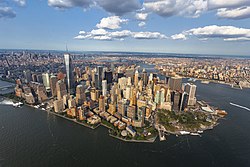
Back منطقة نيويورك الحضرية Arabic Área metropolitana de Nueva York AST Nyu-York aqlomerasiya regionu Azerbaijani Wawengkon métropolitan New York BAN Голям Ню Йорк Bulgarian নিউ ইয়র্ক মহানগর এলাকা Bengali/Bangla Àrea metropolitana de Nova York Catalan Newyorská metropolitní oblast Czech New Yorks storbyområde Danish New York Metropolitan Area German

The New York metropolitan area is the city and suburbs of New York City. It includes Long Island and the Mid- and Lower Hudson Valley in the state of New York. It also includes north and central New Jersey, three counties in western Connecticut and five counties in eastern Pennsylvania.
The New York metropolitan area is the most populous in US. This includes the numbers defined by both the Metropolitan Statistical Area (20.1 million residents) and the Combined Statistical Area (22.4 million residents).[2] It is also one of the most populous built-up areas in the world, and the single largest in North America.[5][6][7]
- ↑ 1.0 1.1 "Urban and Rural: List of 2020 Census Urban Areas". United States Census Bureau. Retrieved July 22, 2023.
- ↑ 2.0 2.1 "Metropolitan and Micropolitan Statistical Areas Population Totals: 2020-2023". United States Census Bureau, Population Division. March 14, 2024. Retrieved March 15, 2024.
- ↑ "Total Gross Domestic Product for New York-Newark-Jersey City, NY-NJ-PA (MSA)", Federal Reserve Economic Data, Federal Reserve Bank of St. Louis
- ↑ "Gross Domestic Product by County and Metropolitan Area", Federal Reserve Economic Data, Federal Reserve Bank of St. Louis
- ↑ "World's Largest Urban Areas [Ranked by Urban Area Population]". Rhett Butler. 2003–2006. Retrieved 2011-11-25.
- ↑ "Largest Cities of the World – (by metro population)". Woolwine-Moen Group d/b/a Graphic Maps. Retrieved 2011-11-25.
- ↑ "Largest urban areas in the world: 2008 All Urban Areas 2,000,000 & Over" (PDF). Wendell Cox Consultancy. Retrieved 2011-11-25.

